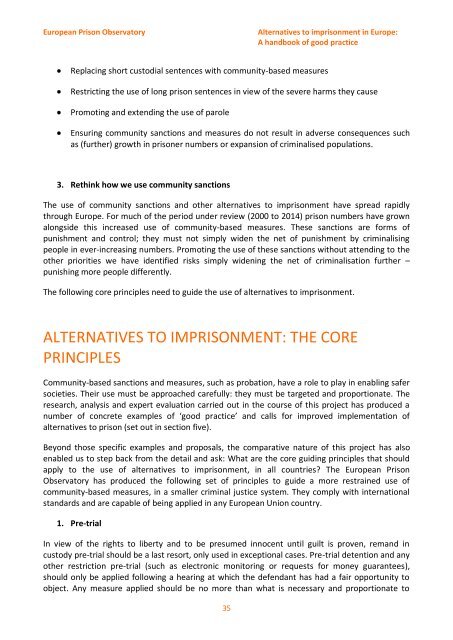good practice
Alternatives%20to%20imprisonment%20in%20Europe
Alternatives%20to%20imprisonment%20in%20Europe
You also want an ePaper? Increase the reach of your titles
YUMPU automatically turns print PDFs into web optimized ePapers that Google loves.
European Prison Observatory<br />
Alternatives to imprisonment in Europe:<br />
A handbook of <strong>good</strong> <strong>practice</strong><br />
<br />
<br />
<br />
<br />
Replacing short custodial sentences with community-based measures<br />
Restricting the use of long prison sentences in view of the severe harms they cause<br />
Promoting and extending the use of parole<br />
Ensuring community sanctions and measures do not result in adverse consequences such<br />
as (further) growth in prisoner numbers or expansion of criminalised populations.<br />
3. Rethink how we use community sanctions<br />
The use of community sanctions and other alternatives to imprisonment have spread rapidly<br />
through Europe. For much of the period under review (2000 to 2014) prison numbers have grown<br />
alongside this increased use of community-based measures. These sanctions are forms of<br />
punishment and control; they must not simply widen the net of punishment by criminalising<br />
people in ever-increasing numbers. Promoting the use of these sanctions without attending to the<br />
other priorities we have identified risks simply widening the net of criminalisation further –<br />
punishing more people differently.<br />
The following core principles need to guide the use of alternatives to imprisonment.<br />
ALTERNATIVES TO IMPRISONMENT: THE CORE<br />
PRINCIPLES<br />
Community-based sanctions and measures, such as probation, have a role to play in enabling safer<br />
societies. Their use must be approached carefully: they must be targeted and proportionate. The<br />
research, analysis and expert evaluation carried out in the course of this project has produced a<br />
number of concrete examples of ‘<strong>good</strong> <strong>practice</strong>’ and calls for improved implementation of<br />
alternatives to prison (set out in section five).<br />
Beyond those specific examples and proposals, the comparative nature of this project has also<br />
enabled us to step back from the detail and ask: What are the core guiding principles that should<br />
apply to the use of alternatives to imprisonment, in all countries? The European Prison<br />
Observatory has produced the following set of principles to guide a more restrained use of<br />
community-based measures, in a smaller criminal justice system. They comply with international<br />
standards and are capable of being applied in any European Union country.<br />
1. Pre-trial<br />
In view of the rights to liberty and to be presumed innocent until guilt is proven, remand in<br />
custody pre-trial should be a last resort, only used in exceptional cases. Pre-trial detention and any<br />
other restriction pre-trial (such as electronic monitoring or requests for money guarantees),<br />
should only be applied following a hearing at which the defendant has had a fair opportunity to<br />
object. Any measure applied should be no more than what is necessary and proportionate to<br />
35





